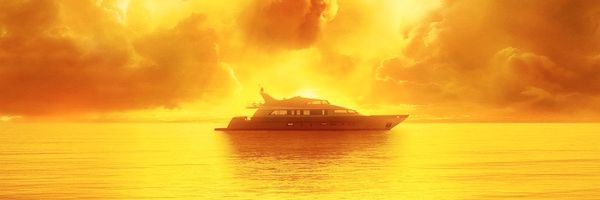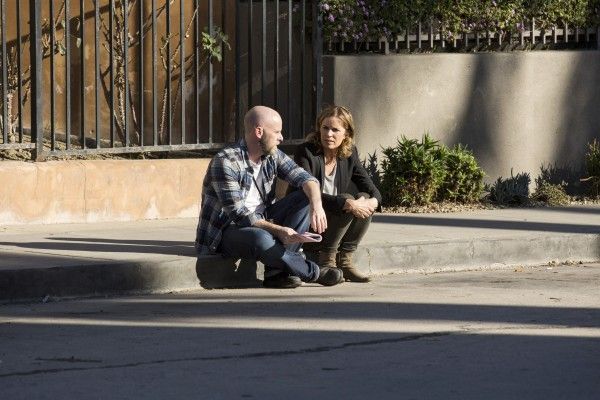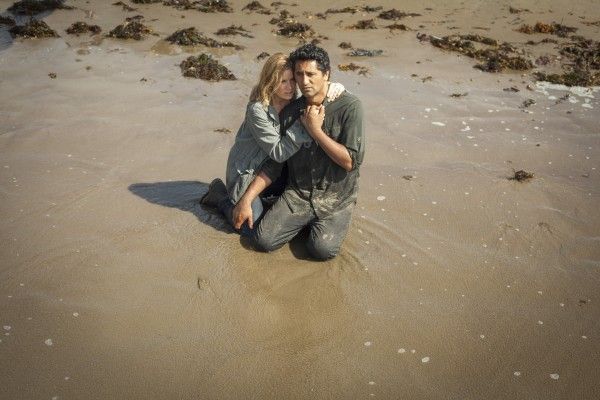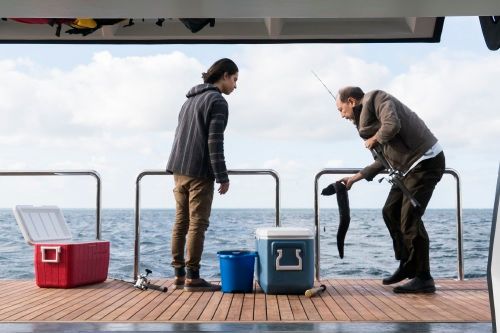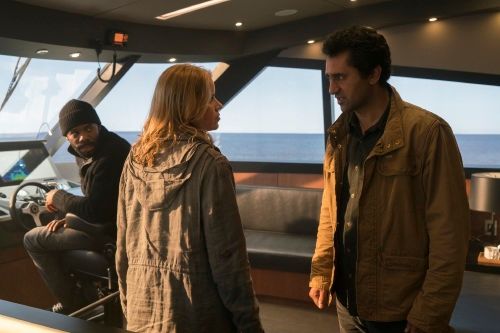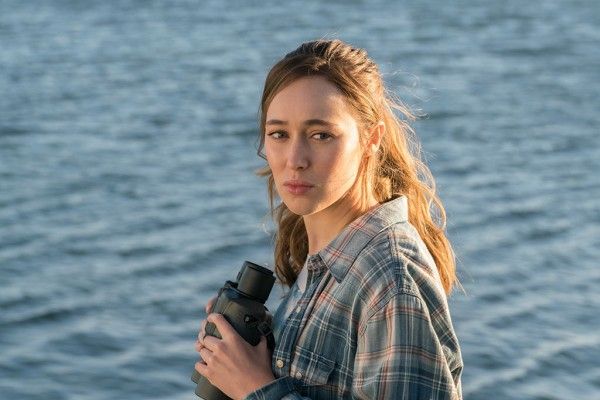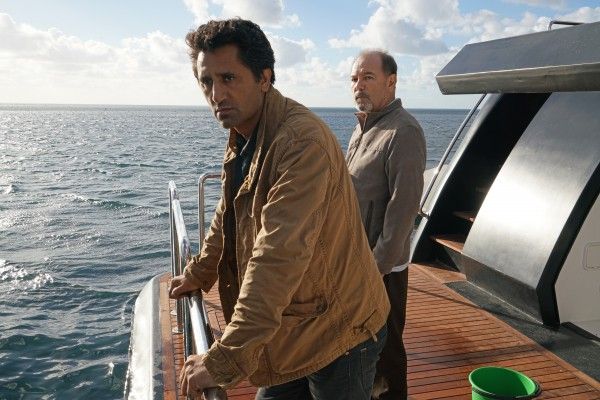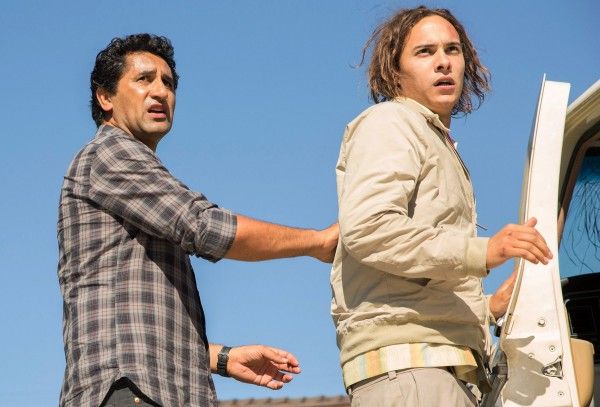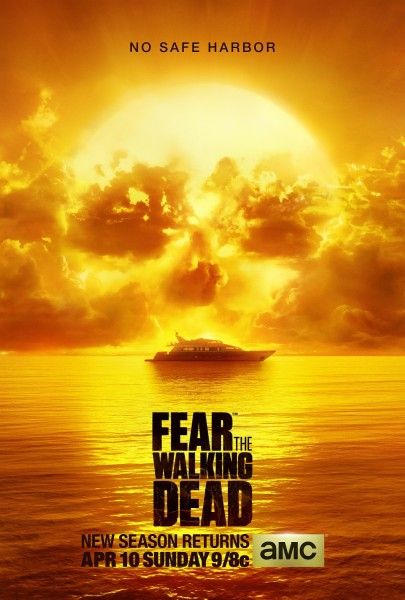AMC's The Walking Dead is such a mammoth success that the spin-off series could have easily been a cash-grabbing paint-by-numbers replica. Fortunately, we got Fear the Walking Dead instead. A unique, slow-burn spin on the zombie genre that's not afraid to take its time with the requisite undead action and dive in to intimate character drama and the ramifications of societal collapse in its stead. The first season of Fear the Walking Dead explored followed the the core cast of characters as they formed a new post-apocalyptic family unit, loved ones and strangers forced into an uneasy alliance by circumstance. Season 2 finds the survivors thrust into ever-escalating danger as they take to the high seas in search of a safe haven -- one we know they'e all to unlikely to find.
With Fear the Walking Dead returning tonight on AMC, I recently sat down with showrunner Dave Erickson to discuss what lies ahead in Season 2. We talked about keeping the tension and anxiety high now that the apocalypse is fully underway, watching the characters discover and define their moral compases, how he plans to prevent Fear the Walking Dead from becoming The Walking Dead redux, fulfulling and subverting genre conventions, and a lot more. Check it out in the interview below.
I really loved the first season of Fear the Walking Dead and it was interesting for me because I had actually fallen off of The Walking Dead. I was like, “Okay, I can’t watch people die for a while.”
ERICKSON: It’s bleak.
Yeah. But what I – As a huge fan of the apocalypse genre, the first season was very much something I had always wanted to see, where the end of the world wasn't wrapped up in a two hour movie, but it was thoughtfully played out with a slower burn. But now, not that you’re fully into the apocalypse, but you’re getting close. So how much of a redirect is that for you and how are you approaching that?
ERICKSON: The good news – upside and downside. I think in terms of the apocalyptic education, I think the bulk of it in season one had more to do with the dead and what’s happening to these people, and are they still people? But what’s interesting to me is in season one we were relatively insulated, it was right at the moment where we began to wrap our brains around what was happening as the national guard arrives. And then two episodes, we did a time jump and we’re relatively trapped behind a fence, trusting or hoping the national guard was telling us the truth. We didn’t get a sense of the scope of it, I think, until we escaped from the compound and headed towards the coast. And what we wanted to do this season was a), make it very clear there was no home to go back to, because I do think the loss of Liza, the loss of Griselda, we didn’t want to run away from those. We wanted to make sure there was time to breathe and see how they would respond in that moment.
So they’ve lost those people they’ve also lost their home, and what’s interesting, we now are in a phase where we are on the boat, we have not had the benefit of a governmental download where we know that it is a global event and that the world is gone and we better start over. And for our family, their not knowing -- for some it provides hope, for others it drives them to the edge and puts them in a very precarious position. And everyone’s appreciation or understanding of what’s going on is really specific and is tied to who they are when we first met them. I mean, Nick, obviously at the end of last season, says, “The world is catching up with me, I’ve been living my own apocalypse and now it’s here,” and he’s going to be highly functional when it comes to this world. The problem for Nick is he’s stopped shooting heroin, but he hasn’t stopped being an addict, so it’s just a matter of where he’s going to direct it. Alicia was set, Alicia knew what her future was and suddenly that’s gone so you’ll see her sort of clinging to what was. She starts in that place, but we can see a progression for Alicia as she grows into somebody who, it just takes her longer to adjust to it, but once she adjusts to it, she’s going to be a much different person than when we first met her.
But it’s really an exploration of, we are on the boat, we know LA is not safe, and we are desperately trying to find out, "Where do we go and how do we piece together this information?" There’s a certain, there’s a mystery quality, but there’s this sense of, “We know LA is gone, we’ve heard some reports from other places, but it can’t be everywhere.” And very quickly we realize we weren’t the only ones with the bright idea to go to sea. It’s not safe on the water, maybe we have to go to land. It’s not safe on land. So what you’ll see over the next few episodes is them sort of starting to piece together better what’s the tapestry of the destruction is and what it is and how far it’s gone. One of the reasons I love 28 Days Later is that, at least for that film, there’s this question of, “Is it just England?” And then, that shot at the end where he looks up and sees the plane flying, that sense of wonder, in a sense I think is painful. I think the longer we can maintain that as an undercurrent for the show and an undercurrent for these characters, I think it’s discomfiting, disquieting and we’re literally and figuratively adrift. It gives itself a tonal flair which is not dissimilar from last season. Because it was about anxiety and a sense of dread and a sense of not knowing, and I think that I’d like to be able to extend it as long as we can until they get to a place. That was long-winded.
What I really liked about season one was that you were not beholden to The Walking Dead in any way, but in terms of looking towards the future, do you have a plan to subvert becoming that ultimately?
ERICKSON: Yes.
Or is that the inevitable destination?
ERIKSON: That’s the biggest challenge of the show. Ultimately, there are certain tropes and conventions that go with the genre. And you have to embrace them to some degree, you need to find a place to live and you need to find a way to survive and fortify and protect yourself. The distinction I would make, and I can’t minimize this because I think the mileage we’re going to get out of this is quite fast, is that because we were able to start where we did, because we were able to move fast over the span of the first few episodes, because we really started as a family drama, and used it as a filter to see the apocalypse, I think it allowed us to set up the dynamics between the characters and relationships, so that that, to me, remains the filter, if that makes sense. And it does not mean that we’re not going to embrace the genre conventions, because you can’t, it’s just the nature of the show. But what it does mean is that Nick, the choices that Nick is going to make during the course of this season, Madison is going to look at through a certain filter. And that filter is going to be “My drug addicted son who is now in danger, and how do I take care of him?” For Alicia it’s going to be, “All the attention always goes to Nick,” and what’s that about? When she starts to grow into this more fearsome, apocalyptic heroine, in part of that is going to be like, “Mom, I’m here too and I’m basically raising myself while you’re dealing with Nick.” All of those things play into the stew a bit. And that’s what I hope makes us specific to our group because it is about those family dynamics ultimately, just rendered large against the backdrop of the apocalypse. It’s that, but then yeah there are zombies too. And I think that’s part of the elements of the comic as well, but if my hope is that if we ground it like we did in their specific dysfunctions, that there’s actually quite a lot of story that can unravel off of that. And Madison too, there’s a lot about here we don’t yet know.
She’s fantastic.
ERICKSON: Oh, I’m never happier than when I’m in editing. Because the great thing about our cast, is they have that facility so even if you wrote a scene that you feel is a six, it usually feels like a nine or a ten. And she’s the most beautifully naturalistic actor. It’s strange because my favorite actors are Kim [Dickens], I love all of them, but Dayton Callie, who she worked with on Deadwood, and then he was on Sons of Anarchy, he’s the same way. Never feels false. But she’s fantastic.
But that character, too, is fantastic. Something else I liked -- and I’m sure this was a little liberty you had because most of the audience had gone through this journey with The Walking Dead -- was you didn’t have to play out the moral compass issues so long. Like everybody’s working on their own moral compass, and they’re trying to find it still. But she was fantastic because she made really hard decisions, some that weren’t awesome in terms of conventional morality, but didn’t torture herself over them. It wasn't overwrought.
ERICKSON: It’s interesting because that’s a really, really good point. I would argue this. She had her first -- she had to put down Artie, a colleague and a friend. The thing about Madison and she speaks to it a little in the pilot, is that whatever she feels is wrong about Nick, for example, it’s really because something is wrong with her. And I think that she owns that in a healthy way, but I think there’s a darkness to her. She’s not a big sharer, it wasn’t as though the second Travis got back she was like, “I gotta tell you what happened at the school.” She owns it and then she kind of moves on, and that’s important because that’s something that we’ll see. The sense of debt that she feels to Nick and Alicia, it really gives her a lot of latitude in terms of what she can do and exactly what she can digest morally.
Interestingly, that was part of the disconnect with her and Travis last season because she – that’s a really good question for Travis as well. Because even though he, up until the bitter end, tried to do the right thing and nearly got killed because of it. And then having to be put into a position where he has to put down Liza...that’s going to shift things between him and Chris in a major way because intellectually, he can have a conversation with Chris that’s like, “She said to do it, and this is what it is right now,” but he’s not going to get that image out of his head. He’s going to see it and imagine it over and over again. So, you take an already disaffected teenager who’s pissed off at his dad because of a divorce, and then you add that to it, and that’s what I mean when I talk about taking these core dysfunctions that I think people can relate to. Which for me, is why The Walking Dead and the comic, and Robert [Kirkman]’s stuff works so well is because there is this accessibility and these are people, for the most part, you know. But I think that’s – it’s going to be interesting to see what happens. I’m excited because I do think we built things to a certain place and the stories of people like Chris and Travis, the roads they are going down now are going to be very specific to who they are and they are going to invert the expectations of where we think they might go.
And they’re all stuck together on a little boat.
ERICKSON: Stuck together on a boat with a guy.
Mystery!
ERICKSON: A mystery man. And we will learn more about that.
How long can you keep that mystery?
ERICKSON: Not that long.
Right, becuase he’s fascinating.
ERICKSON: And Colman [Domingo] is such a fabulous actor and a wonderful guy. The thing about Strand that I love is that he’s performing. And he has that voice and it resonates, and he has a certain poetic quality to how he speaks and that’s by design. What’s interesting is that we will see an unadorned version of Strand over the course of this season, we’ll get a better understanding of who he is. And once his layers are peeled back, it sort of redefines how he connects to Madison, how he connects to Nick, that’ll be an interesting thing.
The Dynamic between Strand and Madison is something I’m very interested to see play out because they could be worst enemies or really get each other.
ERICKSON: I think you are right. I think they recognize something in each other and recognize that they have that quality that makes their ability to survive in this world more likely, and I think they’re drawn to each other because of that. And also, yeah. There’s going to be some lovely scenes between the two of them. It’s an interesting dynamic.
Can you talk about the boat vs. land aspect of this season and as a storyteller how you want to use that? Will land be a point of refuge, or will it be a reminder that there is no refuge?
ERICKSON: It’s a mixture of both. I think once, there was something to me about – it wasn’t my pitch, we always knew we were going to make it to the coast, but the decision to drive up the coast or go north or south, it was David Wiener who pitched the boat originally and I think going way, way back, I think Robert had this idea before anything started. But I think there’s something, for me personally, being stuck in the middle of the ocean with no land in sight is incredibly upsetting and isolating.
Horrifying.
ERICKSON: The idea for me was creating that sort of defcon sense of fear and anxiety. And especially in a situation where you are not certain of the people on the boat with you, you come to realize there are potential threats from other people on the water, you know you can’t go back home again, and it lends itself to an aspiration as to where we are going to go and where is safe? Strangely, by disconnecting ourselves from land I think it amps that up in an interesting way. And also, visually, to see the seascape, it was one of the reasons Robert pitched LA in the first place. In terms of the geography and the topography, you had access to deserts and mountains and the sea. I think that, no matter what happened I always wanted to hold onto the pacific, we just ended up in a position where we could actually be on the water.
Utilize the tools of the setting. I can’t wait to see it. I really love combining these two genres, zombies and seafaring paranoia, two terrifying things put together.
ERICKSON: We’re going to split it, we’ll get some land action relatively soon. So it will be sort of betwixt and between.
Fear the Walking Dead airs Sunday nights at 9/8c on AMC.

